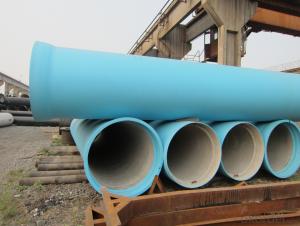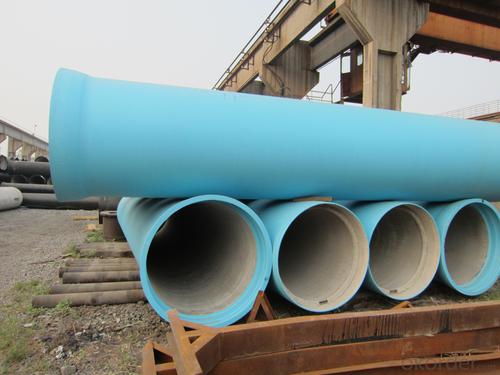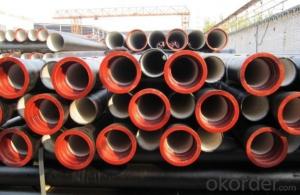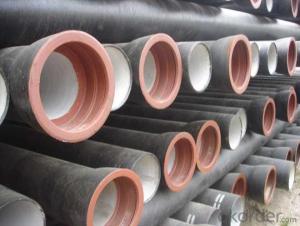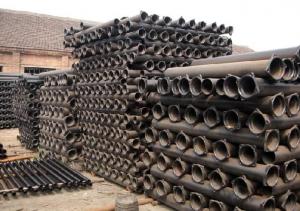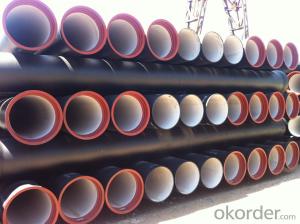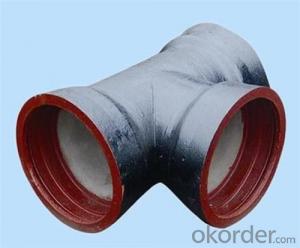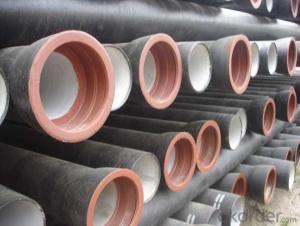Ductile Iron Pipe of China EN545 DN200-DN1000 High Quality
- Loading Port:
- China main port
- Payment Terms:
- TT or LC
- Min Order Qty:
- 20 m.t.
- Supply Capability:
- 100000 m.t./month
OKorder Service Pledge
OKorder Financial Service
You Might Also Like
1,Ductile Iron Pipe Description :
1) Pipes confirm to ISO2531,K9 class,T type joint,6m long,with inside cements lining conform to ISO4179, outside Zinc spraying(130g/m2) and bitumen coating(70μm) conform to ISO8179.
2) Pipe ends: Spigot and socket ends, with 100% SBR rubber gaskets accoding to ISO4633
3) we can do third party inspection according to customer's request.
4) Our products have been sold to many international market, such as Middle East and South East Asia and Africa.
2,Main Features of the Ductile Iron Pipe:
1. Material: Ductile iron grade 500-7/ 450-10 in accordance with ISO1083
2. Standard: ISO 2531, EN545, EN598, ANSI, AWWA
3. Certificate: ISO9001, ISO14001, SGS, NSF, WRAS
4. Test: In accordance with ISO 2531 / EN 545 / EN598 and 100% water pressure test
5. Length: 6m or cut into 5.6m, 5.7m, 5.8m
6. Internal Lining: Cement, conform to ISO4179
7. External coating: Zinc + Bitumen, conform to ISO8179
8. Rubber: NBR, SBR, EPDM according to ISO4633 / EN681.1
9. Note: The gaskets, bolts & nuts are supplied respectively as your special requirement
3,Ductile Iron Pipe Images:
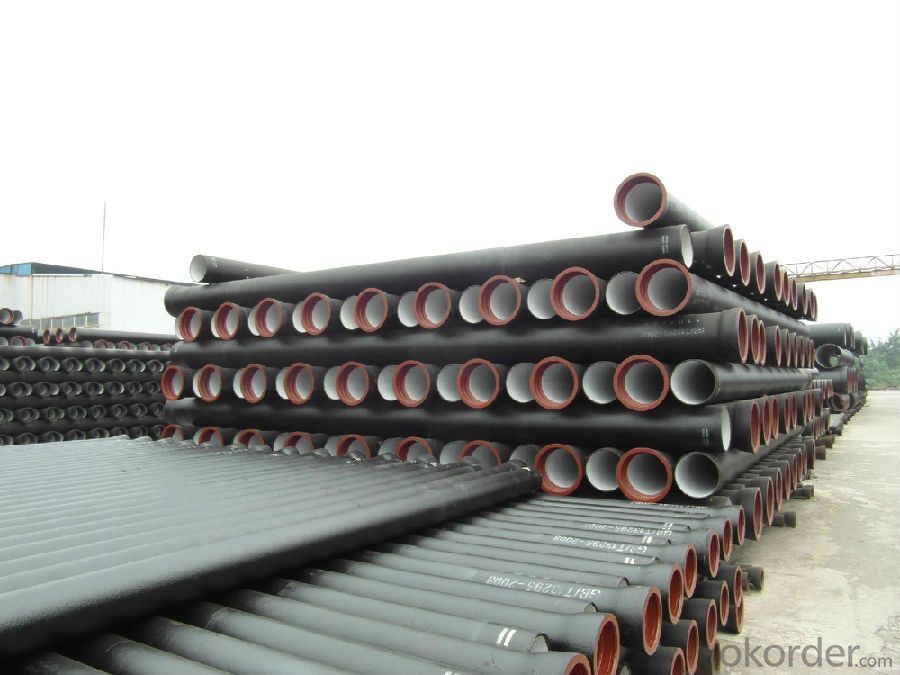
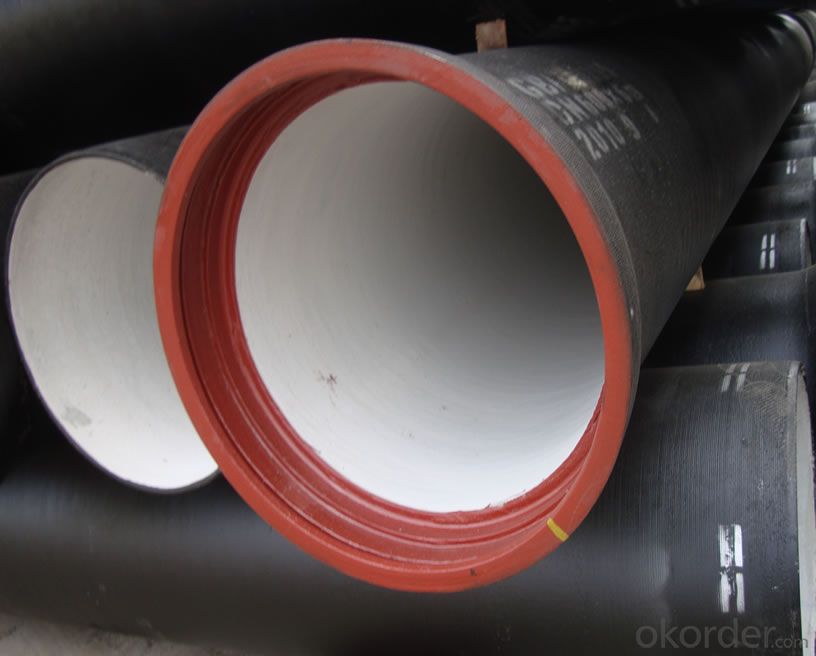
4. Ductile Iron Pipe Specification
Place of Origin: China (Mainland)
Model Number: DN80-1600
Length: 6M/5.7M/NEGOTIATED
Standard: ISO2531 / EN545
Application: Potable/Sewage Water
Diameter: DN80-1600
Shape: Round
Hardness: 230
Pipe Wall Thickness: standerd
Pull Strength: 420
Yield (≥ MPa): 300
Material: Ductile Iron
water ductile iron pipe: SO2531 / EN545 DI pipe
Processing service: Beveling, Threading, Slotting, Cut-to length, Bends, Quench and Temper, Fabrication, Double-jointing and On-site assistance
Documentary: MTC, material certification,Origin certification, CI or PI,Test Report, export licence, handling order, B/L,insurance policy,shipping instructions, contract, packing list etc.
5.FAQ:
We have organized several common questions for our clients,may help you sincerely:
1.Q: Why would you choose ductile iron pipe rather than other pipe materials?
A:The reasons are obvious for that not only ductile iron pipe possesses the inherent strength and flexibility of ductile iron, combined with proven corrosion protection systems, but also the cost savings can be achieved from design to installation and commissioning.
2.Q:Why can you guarantee the inner of pipes can’t be corroded?
A: High alumina cement mortar lining and sulphate-resistant cement mortar lining. These two special linings are applicable to inner anti-corrosion for sewage pipes, improving resistance to erosion of the sewage components.
- Q: What is the composition of ductile iron pipes?
- Ductile iron pipes are primarily composed of iron, with small amounts of carbon, silicon, manganese, and trace elements such as sulfur and phosphorus.
- Q: Are ductile iron pipes resistant to abrasion?
- Yes, ductile iron pipes are highly resistant to abrasion.
- Q: Are ductile iron pipes resistant to seismic events?
- Generally, ductile iron pipes exhibit resistance to seismic events. Ductile iron, a form of cast iron known for its strength and durability, can withstand external forces, including those induced by seismic events like earthquakes. The design of ductile iron pipes allows for flexibility, enabling them to absorb and dissipate energy from seismic waves. This flexibility ensures the pipes remain intact despite ground movements and vibrations, preventing any breakage or cracking. Moreover, the joints of these pipes are designed to offer some level of flexibility, further enhancing their ability to withstand seismic events. Furthermore, the construction of ductile iron pipes involves thick walls, providing them with exceptional structural integrity. This strength reduces their susceptibility to damage during seismic events and ensures a consistent flow of fluids, such as water, even in extreme conditions. Nonetheless, it is crucial to recognize that the resistance of ductile iron pipes to seismic events can depend on various factors. These factors include the magnitude and proximity of the earthquake, the quality of installation and maintenance, and the specific design considerations for the pipeline system. Consequently, it is vital to adhere to proper engineering and construction practices to optimize the resilience of ductile iron pipes in areas prone to seismic activity.
- Q: Is nodular cast iron pipe filled with Yau Ma Tei?
- In many areas of our country, ductile iron pipe in the middle and small diameter to tube connected with the tube, the bearing type or flange interface method; ductile iron, angle limit must be allowed better seismic performance and sealing performance.
- Q: How does the white iron appear in the case of ductile iron?
- Casting cooling, surface and thin section at often produce white. White tissue hard and brittle, poor processing performance, easy peeling. So it is necessary to use the annealing (or normalizing) method to eliminate white tissue. The annealing process: heating to 2 DEG C 550950 ~ 5 h, then 500 to 550 DEG C Furnace cooling again followed by air cooling. During high temperature insulation, high travel cementite eutectic cementite decomposition of graphite and A in the subsequent two carburizing cooling process and eutectoid cementite decomposition, graphitization process. Due to the decomposition of cementite, resulting in the decrease in hardness, thereby improving machinability.Hope to help you.
- Q: What is the weight of ductile iron pipes?
- The weight of ductile iron pipes can vary depending on their size and wall thickness. On average, a 10-foot length of 6-inch diameter ductile iron pipe can weigh approximately 180 pounds. However, it is important to note that different manufacturers may have slight variations in weight due to differences in manufacturing processes and materials used. It is recommended to consult specific product specifications or contact the manufacturer for accurate weight information.
- Q: Can ductile iron pipes be used for submarine pipelines?
- Submarine pipelines can indeed utilize ductile iron pipes. Ductile iron, celebrated for its robustness and durability, proves suitable for a range of applications, including those submerged underwater. For decades, ductile iron pipes have been successfully employed in the construction of submarine pipelines. They possess the ability to endure the harsh conditions prevalent in underwater environments, such as corrosion, pressure, and shifting seabeds. Furthermore, ductile iron pipes display exceptional resistance to external loads, rendering them ideal for submarine pipelines that bear the weight of water and potential impacts. However, it remains imperative to consider factors such as coating, cathodic protection, and proper installation techniques to ensure the long-term performance and integrity of the submarine pipeline.
- Q: Are ductile iron pipes suitable for use in residential plumbing?
- Yes, ductile iron pipes are suitable for use in residential plumbing. Ductile iron is a strong and durable material that is resistant to corrosion, making it ideal for plumbing systems. It has a high tensile strength, which means it can withstand high pressure and is less likely to crack or break compared to other materials. Ductile iron pipes are also known for their long lifespan, lasting up to 100 years or more, making them a reliable choice for residential plumbing systems. Additionally, ductile iron pipes have excellent flow characteristics, allowing for efficient water distribution throughout the home. Overall, the strength, durability, and corrosion resistance of ductile iron pipes make them a suitable and long-lasting option for residential plumbing.
- Q: What is the expected deflection capability of ductile iron pipes?
- The expected deflection capability of ductile iron pipes is typically quite high compared to other pipe materials. Ductile iron pipes have a flexible nature that allows them to withstand external loads and stresses without breaking or cracking. This flexibility enables the pipes to deflect under pressure, absorbing the force and redistributing it evenly along the pipe's length. The specific deflection capability of ductile iron pipes can vary depending on factors such as pipe diameter, wall thickness, and soil conditions. However, in general, ductile iron pipes can typically deflect up to 2% to 5% of their diameter without causing any significant damage or compromising their structural integrity. This deflection capability allows the pipes to adapt to ground movement, thermal expansion, and other external forces, making them highly resilient and reliable for various applications. It is important to note that the deflection capability of ductile iron pipes should be considered in conjunction with other design criteria, such as the depth of the pipe burial, trench width, and backfill material. Following proper installation practices and adhering to industry standards and specifications will ensure that the expected deflection capability of ductile iron pipes is optimized and maintained throughout their service life.
- Q: How do ductile iron pipes compare to PVC pipes?
- Plumbing and water distribution systems commonly utilize ductile iron pipes and PVC pipes. When comparing these materials, various factors should be taken into account. Strength and Durability: Ductile iron pipes are renowned for their exceptional strength and durability. They can withstand high pressure and heavy loads, making them suitable for underground and high-traffic areas. Conversely, PVC pipes are less sturdy and more prone to cracking under extreme conditions. However, PVC pipes have the advantage of being corrosion-resistant and do not rust, which is beneficial in certain environments. Installation and Maintenance: Ductile iron pipes are heavier and require specialized equipment and skilled labor for proper installation. In contrast, PVC pipes are lightweight and easy to handle, making installation simpler and quicker. Additionally, PVC pipes require less maintenance as they do not corrode or develop mineral deposits over time, unlike ductile iron pipes which may need regular cleaning and maintenance to prevent rust and sediment buildup. Cost: PVC pipes generally have a lower cost compared to ductile iron pipes. The lower material and installation expenses associated with PVC pipes make them a popular choice for budget-friendly residential and commercial plumbing projects. Ductile iron pipes, while offering superior strength and durability, tend to be more expensive due to the higher cost of materials, specialized installation requirements, and additional maintenance expenses. Environmental Impact: PVC pipes are made from non-renewable resources and can have a negative environmental impact during production and disposal. On the other hand, ductile iron pipes are made from recycled iron and have a longer lifespan, reducing the need for replacement and minimizing waste. However, it is important to note that PVC pipes can be recycled, and many manufacturers have implemented sustainable practices to minimize their environmental footprint. In conclusion, ductile iron pipes and PVC pipes possess distinct characteristics that make them suitable for different applications. Ductile iron pipes excel in strength and durability, making them ideal for heavy-duty applications, while PVC pipes offer cost-effectiveness, easy installation, and corrosion resistance. Ultimately, the choice between the two materials depends on the specific requirements, budget, and environmental considerations of the project.
Send your message to us
Ductile Iron Pipe of China EN545 DN200-DN1000 High Quality
- Loading Port:
- China main port
- Payment Terms:
- TT or LC
- Min Order Qty:
- 20 m.t.
- Supply Capability:
- 100000 m.t./month
OKorder Service Pledge
OKorder Financial Service
Similar products
Hot products
Hot Searches
Related keywords
